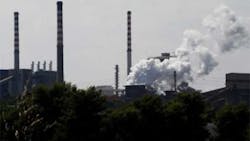Italy to Temporarily Nationalize Troubled Steel Plant
Italy's cabinet on Wednesday said the country's loss-making Ilva steel plant, one of the most polluting in Europe, would be nationalized for up to three years.
The site in Taranto in the Puglia region of southern Italy, which employs over 14,000 people, will be nationalized under a decree adopted by the cabinet, with the view to then putting it up for sale.
"Public intervention is necessary to save it," Prime Minister Matteo Renzi told a press conference, saying three commissioners would be appointed by the government to turn the plant around in a process he expected to take "at least 18 months, at most 36."
The plant has been under special administration since last year, when its owners, the Riva family, were accused of failing to prevent toxic emissions including carcinogenic particles from spewing out across the town.
The decree also earmarked up to 30 million euros (US$36.56 million) for the Puglia region for a cancer centre dedicated particularly to children, as well as a pledge to clean up the southern Italian city's port.
"Happy Christmas to the citizens of Taranto, a city which has been ignored and humiliated by the political sphere. It's our task to make up for the errors of the past," Renzi said.
The Riva family plans to fight any move to nationalize it through the courts, according to Italian media reports.
No other offers have come in yet to save the steelworks, which have the biggest output capacity of any plant in Europe.
International steel giant ArcelorMittal and Italy's Marcegaglia said at the end of November that they had submitted a non-bidding offer to acquire Ilva's operations. It is being examined by Ilva's special commissioner.
The unit is currently operating at roughly half of its peak production level of 11 million tons per year because of weak demand and chronic overcapacity in Europe.
A report by the European Environment Agency on Tuesday named the plant as one of the 30 worst industrial polluters in Europe.
Renzi had been keen to secure some kind of future for Ilva against a gloomy economic backdrop of a contracting economy and stubbornly high unemployment, and had promised a solution by Christmas.
Copyright Agence France-Presse, 2014
About the Author
Agence France-Presse
Copyright Agence France-Presse, 2002-2025. AFP text, photos, graphics and logos shall not be reproduced, published, broadcast, rewritten for broadcast or publication or redistributed directly or indirectly in any medium. AFP shall not be held liable for any delays, inaccuracies, errors or omissions in any AFP content, or for any actions taken in consequence.
